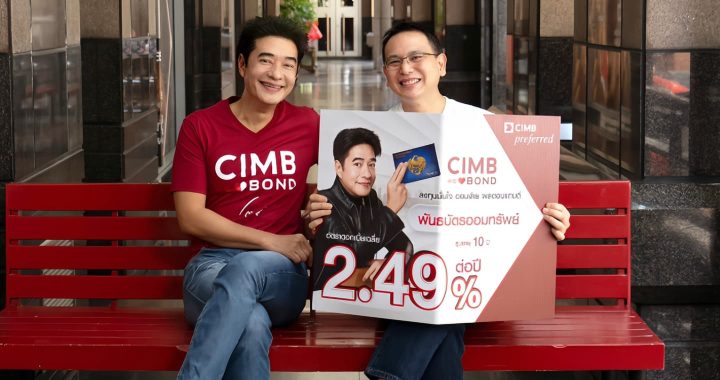SCB CIO foresees private sector bond issuance

SCB CIO foresees private sector bond issuance of over 1.3 trillion baht
SCB CIO recommends that investors carefully consider several key factors when contemplating debenture investments in order to mitigate the risk of defaulting on debt payments. These factors include assessing credit ratings and selecting the appropriate type of debentures, evaluating the corporate governance practices of debenture issuers, and conducting a thorough analysis of financial statements. As interest rates continue to rise, the private sector is anticipated to issue a minimum of 1.3 trillion baht worth of debentures this year, emphasizing the importance of securing favorable financial costs. To achieve a well-balanced portfolio and counteract investment risks, investors are advised to diversify their bond investments both onshore and offshore. Notably, investing in short-term US dollar bonds presents an opportunity to earn returns in the form of interest of approximately 5%.
Mr. Sornchai Suneta, Executive Vice President of the SCB Investment Office and Product Function at Siam Commercial Bank, revealed that the private sector is projected to issue a remarkable sum of at least 1.3 trillion baht in bonds this year, surpassing the previous year’s record of 1.2 trillion baht. This surge can be attributed to the upward trend in interest rates. To mitigate the impact of rising rates, entrepreneurs expedite debenture issuances in order to secure favorable financial costs. In light of recent concerns among investors when bond issuers defaulted on debt repayments, SCB CIO emphasizes the importance of considering key principles before making investment decisions, highlighting four crucial factors:
1) The first factor involves evaluating the credit rating of debentures, which should be conducted by an approved credit rating agency under the supervision of the Office of the Securities and Exchange Commission (SEC). This analysis assists in assessing credibility, with ratings ranging from the highest level of AAA to the lowest rank of BBB-, categorized as Investment Grade (IG). Ratings below this level fall into the high-risk category of high-yield or junk bonds, with D denoting default bonds. Mr. Sornchai advises investors to go beyond considering the offered interest income to also assess the issuer’s ability to repay debt, as this significantly affects risks associated with the investment. Notably, a one-notch decrease in the issuer’s rating doubles the risk of default on debt payments compared to the original rating.
2) Selecting the type of debentures involves considering the different risks and repayment orders associated with each type. Secured Bonds provide the right to assets ahead of other creditors, making them suitable for investors seeking lower risk. Unsecured bonds, on the other hand, possess the same asset rights as ordinary creditors and carry a higher level of risk compared to secured debentures. Senior bonds grant bondholders equal asset claim rights with ordinary creditors and a higher priority than subordinated debentures. Subordinated bonds, or junior bonds, entitle holders to debt repayment after bondholders with collateral and unsubordinated debentures, as well as other ordinary creditors, but before ordinary shareholders.
Presently, debenture products offer greater diversification, such as perpetual bonds, which carry higher risk but can be redeemed upon business dissolution, often yielding higher returns than typical bonds. Convertible bonds can be converted into ordinary shares at a predetermined price, allowing investors to transition from creditors to owners. They are suitable for those expecting higher returns from stock trading price differences. However, if the price of ordinary shares falls below the conversion price, the debentures can be held to receive the principal.
In the Thai private bond market, the majority of products are senior unsecured bonds, with some subordinated perpetual bonds and secured bonds for unrated companies. Even when debentures are secured, investors should consider additional collateral securities like land and stocks, ensuring their value covers the debenture’s worth. If an individual acts as a guarantor, their wealth should be taken into account. Likewise, when using trade account receivables as collateral, the value of such receivables must be considered. It is advisable to select debtors with payment overdue periods of less than 90 days.
3) Corporate governance of the debenture issuer is a crucial consideration for investors seeking to mitigate the risk of investing in companies that engage in financial misrepresentation or internal fraud. SCB CIO believes that future assessments of corporate governance scores for listed companies will become more rigorous. Transparency in information disclosure is a vital aspect of corporate governance that should be evaluated. Investors should assess how much importance the company places on stakeholders such as creditors, shareholders, employees, and society. Additionally, considering the backgrounds of executives is crucial.
4) Preliminary analysis of financial statements involves examining balance sheets, income statements, cash flow statements, and assessing financial ratios. Initially, investors should observe balance sheets for any abnormalities, such as unusually rapid asset growth, significant increases in trade account receivables, or longer debt repayment periods, while considering the proportion of liabilities. Higher proportions indicate increased risk. Furthermore, a company may face bankruptcy with insufficient funds to repay its debt if assets are less than liabilities combined with equity shareholders.
When examining income statements, investors should consider factors such as income growth, and profitability, and compare Earnings Before Interest, Tax, Depreciation, and Amortization (EBITDA) with net profit. It is important to pay attention to any unusual increases in revenue or profit and assess whether the explanations provided for the increases are logical, thus preventing artificial manipulation of financial figures. Cash flow statements hold significant importance for bondholders, as they indicate the actual cash generated from operations. Even if a bond issuer appears highly profitable, a negative cash flow statement can signify a lack of liquidity to meet debt repayment obligations.
Several financial ratios require analysis. The EBITDA/interest expenses ratio helps gauge the ability to pay interest, while EBITDA/(interest expenses + long-term debt due in the next year) assesses debt serviceability. Higher values in these ratios indicate a stronger position. The total liabilities/shareholders’ equity ratio measures the debt-to-equity ratio (D/E), with lower values being more favorable, though a comparison with industry peers is essential. EBITDA/Total Revenue evaluates profitability through operating profit, where higher values indicate better performance. Lastly, net profit/total income examines profitability based on net profit.
In addition to reviewing financial statements, it is crucial to read the accompanying notes. Auditors’ opinions come in four types. An unconditional opinion from a rigorous and reliable auditor provides reassurance to investors. However, if any of the other three opinions are present, investors should conduct further investigations or consider avoiding investments in such companies. These opinions indicate irregularities in financial statements, including qualified opinions (Type 2), statements that are materially misstated (Type 3), or opinions that cannot be expressed (Type 4).
“We advise investors to diversify their bond investments based on both credibility and debenture types. For lower risk tolerance, selecting bonds with top credit ratings such as AA to AAA is advisable. However, for higher-risk profiles, investment in high-yield debentures offering higher returns may be considered. It is important to diversify risk by investing in multiple debentures from various companies, with each debenture holding a relatively small portion of the overall investment portfolio. Alternatively, diversifying risks can be achieved by investing in fixed-income funds managed by professional fund managers,” noted Mr. Sornchai.
Moreover, if investors are willing to accept exchange rate risks, diversifying investments internationally helps create a more balanced investment portfolio instead of concentrating solely on domestic investments. Currently, numerous mutual funds specialize in foreign bond investments, offering the potential for higher returns compared to investments in Thailand due to considerably higher foreign interest rates, particularly when investing in US dollar bonds. Short-term investments present opportunities to receive returns in the form of interest of around 5%.




































